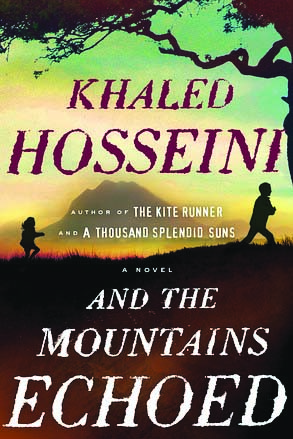Reviewed by Saima S. Hussain
I don’t envy Khaled Hosseini. Really. I don’t.
Just consider the immense pressure he must have dealt with while writing this latest novel, And the Mountains Echoed. He probably lost many nights’ sleep worrying if it would please his fans around the world, fans who have collectively bought over 38 million copies of his first two books. And as he wrote each chapter he was likely weighed down by how influential reviewers would perceive his work and him. No siree. I would not wish that fate on any writer.
It must have been hard enough to write a third novel about Afghanistan. Because even considering its rich history and tribal culture, there are only so many best-selling works of fiction that one person can milk from that ancient land. Even granted the decades of perpetual warfare that have provided plenty of fodder for storytellers, there is only so much of it that will engage an international audience before they cry ‘enough!’ But Hosseini has once again proved to be a compelling storyteller. He grabs the reader’s attention right from the start with the story of Baba Ayub and the terrible div.
It will be a challenge to discuss the novel without giving away too much of the plot. Although there is no earth-shattering surprise in store, there are many significant little twists and turns in the story, which, if revealed here, would take away from the pleasure of those who have yet to read it.
What can be mentioned is the notable absence of the gory details of war. Some will protest at the idea of a novel about Afghanistan — a country tormented by invaders and civil war almost continuously since 1979 — without much mention of these wars. But the war is not ignored; it is just not allowed centre of the stage. Instead, the narrative concentrates on the effects of war, its consequences, its devastations and its aftermath which turned cities into war zones, gave rise to warlords and caused Afghans to flee to many parts of the world.
The particulars of who, what, how, and why are classified as redundant by Hosseini who very cleverly uses Nabi the chauffeur to explain his position: “You know well the recent history of this beleaguered country. I need not rehash for you those dark days … [t]he names changed, as did the faces, and I spit on them equally for all the petty feuds, the snipers, the land mines, bombing raids, the rockets, the looting and raping and killing. Ah, enough! The task is both too great and too unpleasant.” In the same way that war is missing from these pages, so is a central character. Unlike his earlier novels, there is no one single character who can claim to be the protagonist. Instead there is a large cast of characters, all of whom have, more or less, an important part to play. In fact, just when you start to think that one particular character will be the key player he or she vanishes, not showing up again until much later, or in one case, not at all. Meanwhile, a minor character who seemed to be mentioned just by the way, suddenly becomes the central character in the next two chapters. It is almost like a multitude of people milling around on a stage, with each one in his or her turn stepping forward so that their life story may be presented. Old, young, man, woman, child, farmer, doctor, expatriate, aid worker, refugee, poet, and invalid, their stories are varied, just like the literary devices used to tell them, including a deathbed letter and an interview. Some stories are offered as a first-person narrative while others are presented in the third-person. Often, the stories overlap and characters turn out to be connected to one another in some way.
The reader soon realises that these stories are in fact echoes, each one representing some aspect of Afghanistan. They reverberate throughout the book in the form of characters who reappear unexpectedly, often in a different setting and at a later stage in life. Some echoes, such as Nila Wahdati, ring for a long time, while a few like Masooma fade away almost immediately.
This at last explains the reason for the book’s clunky title. So different from the heart-wrenchingly precise The Kite Runner and the (too) lyrical A Thousand Splendid Suns, And the Mountains Echoed is not only a mouthful to say but also somewhat incomplete. Almost every person who heard the title reacted in the same way: an awkward pause followed by a few minutes of hesitation, not quite sure they had heard correctly. It would appear that no one found it enticing enough to discuss any further. One wishes the editorial department had given more consideration to the other options on the list.
One is, however, pleased to report that Pakistan has once again fared well in a Hosseini novel. Not that it comes up very much, but wherever Pakistan is mentioned no poisoned darts are aimed at it. I had also been pleasantly surprised by the portrayal of Peshawar and Islamabad in Hosseini’s first book.
Hosseini has once again created a moving plot, some memorable characters and a solid piece of writing. Even though it does not hold a candle to The Kite Runner, which was first published exactly 10 years ago in 2003, And the Mountains Echoed will prove to be another publishing success story.
Maybe I do envy Khaled Hosseini. Just a little bit.
And the Mountains Echoed(Novel)
By Khaled Hosseini
BloomsburyPublishing, UK
ISBN 9781408842447
402pp.















































Dear visitor, the comments section is undergoing an overhaul and will return soon.